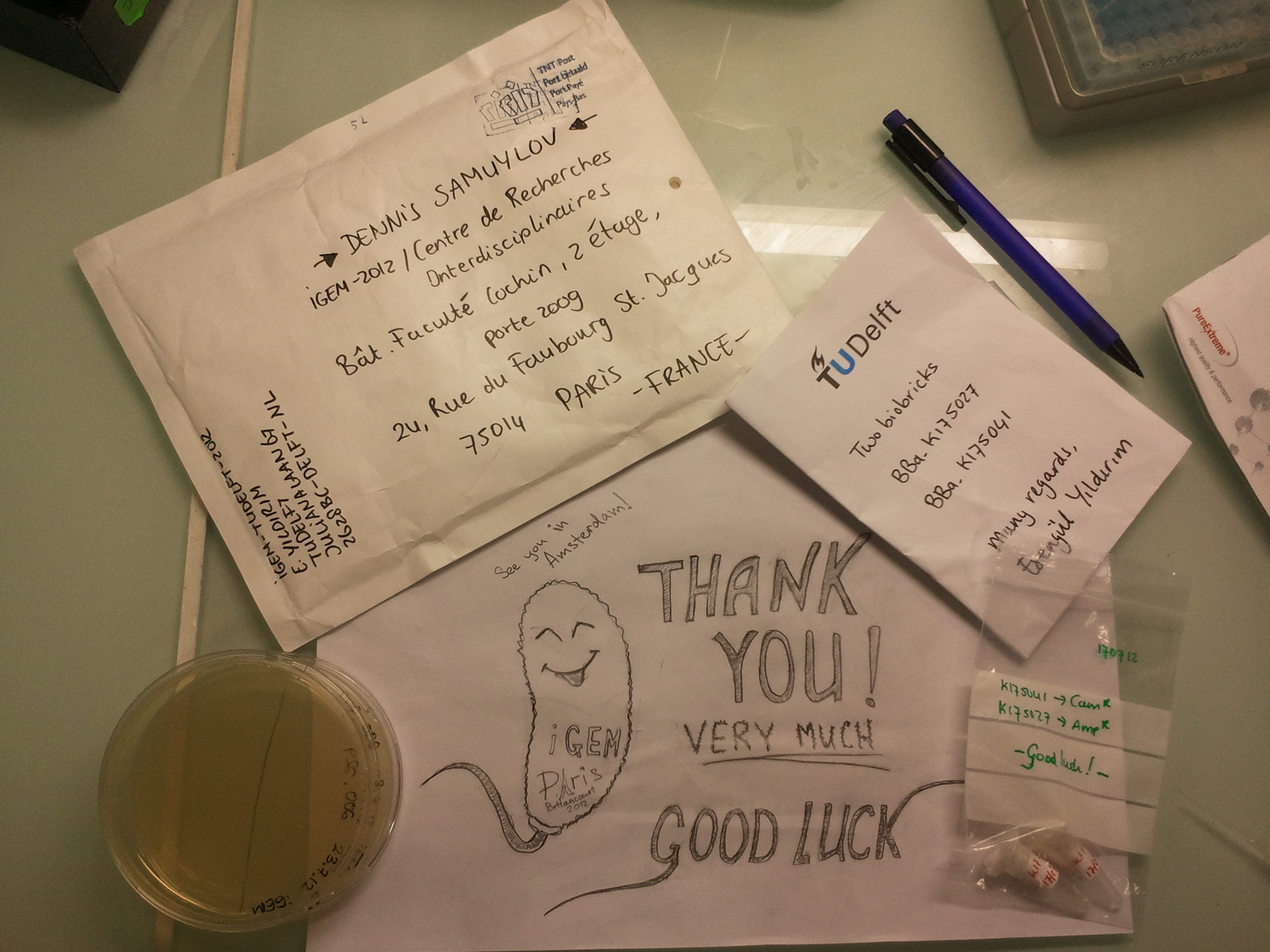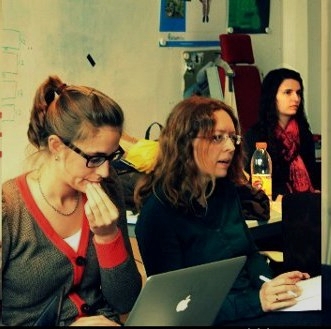Team:TU-Delft/Collaboration
From 2012.igem.org
| (84 intermediate revisions not shown) | |||
| Line 3: | Line 3: | ||
<head><title>Collaboration</title> | <head><title>Collaboration</title> | ||
<body> | <body> | ||
| - | + | ||
<img src="https://static.igem.org/mediawiki/igem.org/7/74/Background_greenlamp.jpg" class="bg_team"> | <img src="https://static.igem.org/mediawiki/igem.org/7/74/Background_greenlamp.jpg" class="bg_team"> | ||
| - | + | <div id="logo_ed"><a href="https://2012.igem.org/Team:TU-Delft" 'onfocus=this.blur()'> | |
| - | + | <img src="https://static.igem.org/mediawiki/igem.org/8/88/Logoigemklein.png" border="0" width="100" height="100"></a></div> | |
| - | + | <div id="contentbox" style="text-align:justify;"> | |
| - | + | <img src="https://static.igem.org/mediawiki/igem.org/0/04/Collaboration2.jpg" align="middle" width="100%"> | |
| - | <h3>Paris Bettencourt</h3> | + | |
| - | + | <br/> | |
| - | <p> | + | <h3>Sharing Biobricks with Paris Bettencourt</h3> |
| - | + | ||
| + | <p>We are honered to have been asked by the <a href="https://2012.igem.org/Team:Paris_Bettencourt" target="_blank">iGEM team Paris Bettencourt 2012</a> to provide them two Biobricks: BBa_K175027 and BBa_K175041. Those biobricks were synthesized by the <a href="https://2009.igem.org/Team:TUDelft" target="_blank">iGEM team TUDelft 2009</a>, project of which was Alkanivore. Alkanivore enables hydrocarbon degradation in aqueous environments. | ||
| + | This year's project of Paris' team is Multiplex automated genome engineering (MAGE), a method for large-scale programming and evolution of cells. | ||
</p> | </p> | ||
| - | <br/> | + | <center> |
| - | <h3>Crash | + | <a href="https://static.igem.org/mediawiki/igem.org/8/8e/Paris_Bettencourt.jpg" target="_blank"><img src="https://static.igem.org/mediawiki/igem.org/8/8e/Paris_Bettencourt.jpg" align="middle" width="50%"></a> |
| - | + | </center> | |
| - | + | ||
| - | + | <br/><br/> | |
| - | + | <h3>Crash Course with Amsterdam iGEM team 2012</h3> | |
| - | + | <p>Right after the new team formation, we invited the <a href="https://2012.igem.org/Team:Amsterdam" target="_blank">Amsterdam team</a> to our University and we together snatched an initial idea of what iGEM project stands for. The crash courses were given by the instructors of both teams and helped us a lot to shape the idea of iGEM project and gave us a direction to walk to. The lectures given were with respect to: | |
| - | + | ||
| - | + | ||
| - | + | <ul> | |
| - | + | <li>Synthetic biology, iGEM, Biobricks and Registry</li> | |
| - | + | <li>Modeling</li> | |
| - | + | <li>Societal valorization</li> | |
| + | <li>Genetic circuit design</li> | ||
| + | <li>Network motifs</li> | ||
| + | |||
| + | </ul> | ||
| + | Is worth to be mentioned that this first meeting with the Amsterdam team helped a lot in our interpersonal relations. After this meeting we came closer with members of the Amsterdam team and that was only the beginning for information exchange. | ||
</p> | </p> | ||
| - | + | <center> | |
| - | + | <table> | |
| - | + | <tr> | |
| - | + | <td><img src="https://static.igem.org/mediawiki/igem.org/e/e7/Aula.PNG" height="140" width="190"></td> | |
| - | + | <td><img src="https://static.igem.org/mediawiki/igem.org/d/d5/Crashcourses1.JPG" height="140" width="190"></td> | |
| - | + | </tr> | |
| + | </table> | ||
| + | </center> | ||
| + | |||
| + | |||
| - | < | + | <br/><br/> |
| - | </ | + | <h3>Life Science Symposium with Cambridge</h3> |
| + | <p>On the 14th of May 2012, the 5th Life Science Symposium “Synthetic Biology – Redefining LIFE” was held in Delft. It was organised by the M&C TNW Department of TUDelft. Our team and the <a href="https://2010.igem.org/Team:Cambridge" target="_table">iGEM team of Cambridge 2010</a> worked together to present what the iGEM competition is and illustrated it by giving examples of our projects, odor detecting system and light emitting bacteria!</p> | ||
| - | </ | + | <center> |
| - | </html> | + | <td><img src="https://static.igem.org/mediawiki/igem.org/c/c2/LifeSym1.PNG" align="middle" width="60%"></td> |
| + | <br><br/> | ||
| + | <td><img src="https://static.igem.org/mediawiki/igem.org/f/f0/LifeSym2.PNG" align="middle" width="60%"></td> | ||
| + | </center> | ||
| + | |||
| + | <br/><br/> | ||
| + | <h3>"Meeting of young minds" with UCL</h3> | ||
| + | <p><a href=" https://2012.igem.org/Regions/Europe/MeetingofYoungMinds">Meeting of Young Minds</a> organized by Rathenau Instituut in the context of the regional iGEM committee. The debate will be held in the evening of 5 October, aiming at the youth discussion of promise and perils of synthetic biology. <a href="https://2012.igem.org/Team:University_College_London" target="_blank">UCL iGEM team 2012</a> and our team exchanged information for our two proposals and our subjects are finally honored. | ||
| + | <br> | ||
| + | Click <a href=" http://www.rathenau.nl/agenda/bijeenkomsten/meeting-of-young-minds-over-synthetische-biologie-op-5-oktober-2012.html" target="_blank">here</a> for more information about the upcoming meeting. | ||
| + | |||
| + | <h3>Collaborative Learning</h3> | ||
| + | |||
| + | <p>During the brainstorm sessions a MSc student in Educational studies, Amalia Ephrat, has recorded the way this team came to their final topic Snifferomyces! The team helped her to study the collaborative learning activities between students with different international backgrounds within the learning context of the University. The main focus of her research is the collaborative process in the iGEM group and the efficacy of the interventions of the supervisors to support the collaborative process in a culturally diverse group of students. | ||
| + | <br/> When students of diverse backgrounds participate in a project where collaborative learning is important, the cultural differences can pose a series of challenges to the group processes. This is a well-known challenge for many Dutch universities, which makes it a relevant topic for educational research to investigate the means for intervention and the effects of those interventions on collaborative learning processes and outcomes. | ||
| + | <br/> | ||
| + | <br/>Her plan is to improve collaborative learning amongst students of different backgrounds, by designing research and conduct measurement during the brainstorming phase of the project. Her research shall consist of qualitative exploratory methods using observational methods and interviews and quantitative research using several questionnaires, including collaborative skills, empathy and intercultural conflict management.<br/></p> | ||
| + | |||
| + | <center> | ||
| + | <table width="100%" > | ||
| + | <tr><td><a href='https://static.igem.org/mediawiki/igem.org/4/4b/Amalia01.jpg' rel="lightbox" target="_blank"><img src='https://static.igem.org/mediawiki/igem.org/4/4b/Amalia01.jpg' height=120 width=140 /></a></td> | ||
| + | <td><a href='https://static.igem.org/mediawiki/igem.org/8/81/Amalia02.jpg' rel="lightbox" target="_blank"><img src='https://static.igem.org/mediawiki/igem.org/8/81/Amalia02.jpg' height=120 width=160 /></a></td> | ||
| + | <td><a href='https://static.igem.org/mediawiki/igem.org/6/67/Amalia03.jpg' rel="lightbox" target="_blank"><img src='https://static.igem.org/mediawiki/igem.org/6/67/Amalia03.jpg' height=120 width=140 /></a></td> | ||
| + | <td><a href='https://static.igem.org/mediawiki/igem.org/d/d6/Amalia04.jpg' rel="lightbox" target="_blank"><img src='https://static.igem.org/mediawiki/igem.org/d/d6/Amalia04.jpg' height=120 width=140 /></a></td> | ||
| + | </tr> | ||
| + | </table> | ||
| + | </center> | ||
| + | |||
| + | </div> | ||
| + | <img src="https://static.igem.org/mediawiki/igem.org/3/37/Footer_2.jpg" align="middle" width="690"> | ||
| + | <a href='https://2012.igem.org/Main_Page' target="_blank"><div id='logo_igem2'></div><a/></body></html> | ||
Latest revision as of 01:32, 27 October 2012


Sharing Biobricks with Paris Bettencourt
We are honered to have been asked by the iGEM team Paris Bettencourt 2012 to provide them two Biobricks: BBa_K175027 and BBa_K175041. Those biobricks were synthesized by the iGEM team TUDelft 2009, project of which was Alkanivore. Alkanivore enables hydrocarbon degradation in aqueous environments. This year's project of Paris' team is Multiplex automated genome engineering (MAGE), a method for large-scale programming and evolution of cells.

Crash Course with Amsterdam iGEM team 2012
Right after the new team formation, we invited the Amsterdam team to our University and we together snatched an initial idea of what iGEM project stands for. The crash courses were given by the instructors of both teams and helped us a lot to shape the idea of iGEM project and gave us a direction to walk to. The lectures given were with respect to:
- Synthetic biology, iGEM, Biobricks and Registry
- Modeling
- Societal valorization
- Genetic circuit design
- Network motifs
 |
 |
Life Science Symposium with Cambridge
On the 14th of May 2012, the 5th Life Science Symposium “Synthetic Biology – Redefining LIFE” was held in Delft. It was organised by the M&C TNW Department of TUDelft. Our team and the iGEM team of Cambridge 2010 worked together to present what the iGEM competition is and illustrated it by giving examples of our projects, odor detecting system and light emitting bacteria!


"Meeting of young minds" with UCL
Meeting of Young Minds organized by Rathenau Instituut in the context of the regional iGEM committee. The debate will be held in the evening of 5 October, aiming at the youth discussion of promise and perils of synthetic biology. UCL iGEM team 2012 and our team exchanged information for our two proposals and our subjects are finally honored.
Click here for more information about the upcoming meeting.
Collaborative Learning
During the brainstorm sessions a MSc student in Educational studies, Amalia Ephrat, has recorded the way this team came to their final topic Snifferomyces! The team helped her to study the collaborative learning activities between students with different international backgrounds within the learning context of the University. The main focus of her research is the collaborative process in the iGEM group and the efficacy of the interventions of the supervisors to support the collaborative process in a culturally diverse group of students.
When students of diverse backgrounds participate in a project where collaborative learning is important, the cultural differences can pose a series of challenges to the group processes. This is a well-known challenge for many Dutch universities, which makes it a relevant topic for educational research to investigate the means for intervention and the effects of those interventions on collaborative learning processes and outcomes.
Her plan is to improve collaborative learning amongst students of different backgrounds, by designing research and conduct measurement during the brainstorming phase of the project. Her research shall consist of qualitative exploratory methods using observational methods and interviews and quantitative research using several questionnaires, including collaborative skills, empathy and intercultural conflict management.
 |
 |
 |
 |

 "
"
